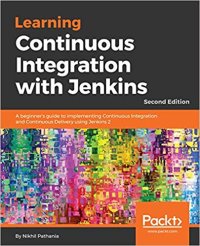
Ebook: Learning Continuous Integration with Jenkins: A beginner’s guide to implementing Continuous Integration and Continuous Delivery using Jenkins 2
Author: Nikhil Pathania
- Genre: Computers // Networking: Internet
- Tags: Java, Distributed Systems, Pipelines, Deployment, Agile, Scrum, Continuous Delivery, Jenkins, Continuous Integration, Testing, Version Control, SonarQube, Artifactory
- Year: 2017
- Publisher: Packt Publishing
- City: Birmingham, UK
- Edition: 2
- Language: English
- pdf
Key Features
• Understand the concepts of Continuous Integration
• Take advantage of a Continuous Integration and Continuous Delivery solution to speed up productivity and achieve faster software delivery
• Learn all the new features introduced in Jenkins 2.x, such as "Pipeline as code", "Multibranch pipeline", "Docker Plugin" and more
• Learn to implement Continuous Integration and Continuous Delivery by orchestrating multiple DevOps tools using Jenkins
• Learn everything about Jenkins Blue Ocean
Book Description
In past few years, agile software development has seen tremendous growth. There is a huge demand for software delivery solutions that are fast yet flexible to numerous amendments. As a result, Continuous Integration (CI) and Continuous Delivery (CD) methodologies are gaining popularity.
This book starts off by explaining the concepts of CI and its significance in the Agile world with a whole chapter dedicated to it. Next, you'll learn to configure and set up Jenkins in many favourite ways. The way the world sees CI/CD is changing, and so is Jenkins. The book exploits the concept of "pipeline as code" and various other features introduced in the Jenkins 2.x release to its full potential.
We also talk in detail about the new Jenkins Blue Ocean interface and its features to quickly and easily create a CI pipeline. You'll gain a foothold in implementing CI and CD methods. Then we dive into the various features offered by Jenkins one by one, exploiting them for CI and CD. Jenkins' core functionality and flexibility allows it to fit in a variety of environments and can help streamline the development process for all stakeholders. Next, you'll be introduced to CD and will learn to achieve it using Jenkins.
Through this book's wealth of best practices and real-world tips, you'll discover how easy it is to implement CI and CD using Jenkins.
What you will learn
• Get to know some of the most popular ways to set up Jenkins
• See all the new features introduced in the latest Jenkins such as Pipeline as code, Multibranch pipeline, and more
• Manage users, projects, and permissions in Jenkins to ensure better security
• Leverage the power of plugins in Jenkins
• Know how to create CI pipeline using Jenkins Blue Ocean
• Create a distributed build farm using Docker and use it with Jenkins
• Implement Continuous Integration and Continuous Delivery using Jenkins
• See the difference between Continuous Delivery and Continuous Deployment
• Understand the concepts of Continuous Integration
• Understand the concepts of Continuous Integration
• Take advantage of a Continuous Integration and Continuous Delivery solution to speed up productivity and achieve faster software delivery
• Learn all the new features introduced in Jenkins 2.x, such as "Pipeline as code", "Multibranch pipeline", "Docker Plugin" and more
• Learn to implement Continuous Integration and Continuous Delivery by orchestrating multiple DevOps tools using Jenkins
• Learn everything about Jenkins Blue Ocean
Book Description
In past few years, agile software development has seen tremendous growth. There is a huge demand for software delivery solutions that are fast yet flexible to numerous amendments. As a result, Continuous Integration (CI) and Continuous Delivery (CD) methodologies are gaining popularity.
This book starts off by explaining the concepts of CI and its significance in the Agile world with a whole chapter dedicated to it. Next, you'll learn to configure and set up Jenkins in many favourite ways. The way the world sees CI/CD is changing, and so is Jenkins. The book exploits the concept of "pipeline as code" and various other features introduced in the Jenkins 2.x release to its full potential.
We also talk in detail about the new Jenkins Blue Ocean interface and its features to quickly and easily create a CI pipeline. You'll gain a foothold in implementing CI and CD methods. Then we dive into the various features offered by Jenkins one by one, exploiting them for CI and CD. Jenkins' core functionality and flexibility allows it to fit in a variety of environments and can help streamline the development process for all stakeholders. Next, you'll be introduced to CD and will learn to achieve it using Jenkins.
Through this book's wealth of best practices and real-world tips, you'll discover how easy it is to implement CI and CD using Jenkins.
What you will learn
• Get to know some of the most popular ways to set up Jenkins
• See all the new features introduced in the latest Jenkins such as Pipeline as code, Multibranch pipeline, and more
• Manage users, projects, and permissions in Jenkins to ensure better security
• Leverage the power of plugins in Jenkins
• Know how to create CI pipeline using Jenkins Blue Ocean
• Create a distributed build farm using Docker and use it with Jenkins
• Implement Continuous Integration and Continuous Delivery using Jenkins
• See the difference between Continuous Delivery and Continuous Deployment
• Understand the concepts of Continuous Integration
Download the book Learning Continuous Integration with Jenkins: A beginner’s guide to implementing Continuous Integration and Continuous Delivery using Jenkins 2 for free or read online
Continue reading on any device:

Last viewed books
Related books
{related-news}
Comments (0)